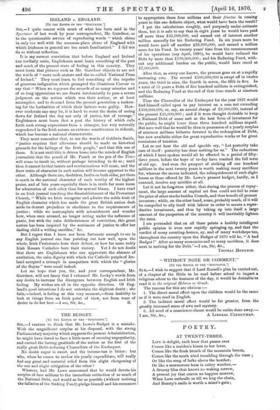IRELAND v. ENGLAND.
[To THE EDITOR OF THE "SPECTATOR."]
quite concur with much of what has been said in the Spectator of last week by your correspondent, Mr. Gairduer, as to the questionable service of reproducing words " which chime in only too well with the common-place abuse of England with which Irishmen in general are too much familiarized." I did not do so without reflection.
It is my earnest conviction that before England and Ireland can cordially unite, Englishmen must learn something of the past and much of the present state of feeling in this country. They must learn that phrases such as Mr. Gairdner objects to are not the words of " mere mob orators and the so-called National Press of Ireland." They must learn to feel something of the impulse of generous indignation which prompted the illustrious Cavour to say that " When we reperuse the records of so many miseries and of so long oppressions we are drawn involuntarily to pass a severe judgment on the nation which was their author, or at least accomplice, and to demand from the present generation a reckon- ing for the barbarities of which their fathers were guilty. How- ever moderate one may be, it is hard to resist the desire of seeing down for Ireland the day not only of justice, but of revenge." Englishmen must learn that a past the history of which calls forth such strong expressions from a stranger, has very naturally engendered in the Irish nature an extreme sensitiveness to ridicule, which has become a national characteristic.
They must remember that, to use the words of Goldwin Smith, "justice requires that allowance should be made on historical grounds for the failings of the Irish people," and that this one of them. It is not until this is driven home into the minds of English journalists that the pencil of Mr. Punch or the pen of the Times will cease to insult us, without perhaps intending to do so ; until then it cannot be that taunts and recriminations will cease, and the finer traits of character in each nation will become apparent to the other. Although there are, doubtless, faults on both sides, yet there is much in the national character of each worthy of the highest praise, and of late years especially there is in truth far more room for admiration of each other than for mutual blame. I have read in an Irish journal touching the disestablishment of the Protestant Church, " While we Irish recognize and admire the noble trait of English character which has made the great British nation dash aside its dearest prejudices in obedience to the requirements of justice ; while we contemplate with astonishment and wonder how, when once aroused, no longer acting under the influence of panic, but with the calm deliberateness of conviction, this great nation has been inspired by the sentiment of justice to offer her darling child a willing sacrifice," &c.
But 1 regret that I have not been fortunate enough to see in any English journal one line pointing out how well, upon the whole, Irish Protestants bore their defeat, or how far more nobly Irish Roman Catholics bore their victory. Yet I do not doubt that there are Englishmen who can appreciate the absence of exaltation, the calm dignity with which the Catholic people of Ire- land accepted a triumph in comparison with which the " glories of the Boyne " were small indeed.
Let me hope that you, Sir, and your correspondent, Mr.
Gairdner, will not fancy that I exhumed Mr. Lecky's words from any desire to increase the divergence between English and Irish feeling. My wishes are all in the opposite direction. Of Eng- land's good intentions I do not entertain the slightest doubt ; she fails,—indeed, is failing at this very moment,—from inability to look at things from an Irish point of view, not from want of desire to do her best.—I am, Sir, &c., R.






























 Previous page
Previous page